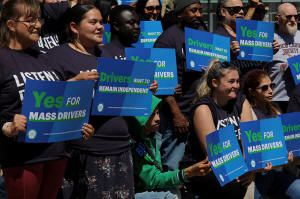Massachusetts top court to hear challenges to gig worker ballot measures
 Send a link to a friend
Send a link to a friend
 [May 06, 2024] By
Nate Raymond [May 06, 2024] By
Nate Raymond
BOSTON (Reuters) - The top Massachusetts court on Monday is set to
consider whether the state's voters will get to decide two ballot
proposals in November that would redefine the relationship between
app-based companies like Uber Technologies and Lyft and their drivers -
one backed by industry and the other by labor.
The Massachusetts Supreme Judicial Court first will hear arguments in a
labor-backed challenge to a ballot proposal by an industry-supported
group that would ask voters to declare that the drivers for the
companies are not employees but rather independent contractors entitled
to some new benefits.
The court then will hear a challenge by a conservative think tank to a
proposed ballot measure supported by the Service Employees International
Union's Local 32BJ that would ask voters to allow Uber and Lyft drivers
to unionize.
Using contractors can cost companies as much as 30% less than using
employees, according to various studies. A ballot victory for the
companies in a state with some of the most employee-friendly laws could
embolden them to pursue similar measures in other states, according to
labor activists.
Uber and Lyft, along with app-based delivery services Instacart and
DoorDash, have spent millions of dollars to support the ballot proposal
that would cement the status of their drivers as contractors under state
law.
The proposal by Flexibility and Benefits for Massachusetts Drivers, a
ballot measure committee whose contributors include the four companies,
also would establish an earnings floor equal to 120% of the state's
minimum wage for app-based drivers, or $18 an hour in 2023 before tips.
Drivers would receive healthcare stipends, occupational accident
insurance and paid sick time under the proposal.

[to top of second column] |

Rideshare and delivery drivers pose for group photograph as they
gather in support of an industry-supported ballot measure that seeks
to ask Massachusetts voters to decide whether ride-share and
delivery drivers for companies like Uber and Lyft should be treated
as independent contractors rather than employees, in Worcester,
Massachusetts, U.S., April 23, 2024. REUTERS/Brian Snyder/File Photo

The same court in 2022 blocked a similar industry-backed ballot
measure, finding that it contained an unrelated proposal that ran
afoul of a state constitutional requirement that ballot questions be
limited to related subjects.
To hedge its bets, Flexibility and Benefits for Massachusetts
Drivers is gathering signatures for five different versions of the
current ballot question, only one of which would be put before
voters on Nov. 5.
Uber and Lyft also are preparing to face a May 13 trial in a civil
lawsuit filed in 2020 by the state. The state's Democratic attorney
general, Andrea Joy Campbell, is asking a judge to conclude that the
two companies have been unlawfully classifying their drivers as
contractors, not employees.
Should Uber and Lyft lose that trial and fail to win over voters at
the ballot box, the companies have said they could be forced to
cease operations in Massachusetts due to the economics.
If the industry-backed ballot measure passes but the state wins in
the trial, Campbell's office has said the new law would control for
the future but that Uber and Lyft could be subject to penalties for
the past misclassification of their drivers.
(Reporting by Nate Raymond in Boston, Editing by Will Dunham and
Alexia Garamfalvi)
[© 2024 Thomson Reuters. All rights
reserved.]
This material may not be published,
broadcast, rewritten or redistributed.
Thompson Reuters is solely responsible for this content. |